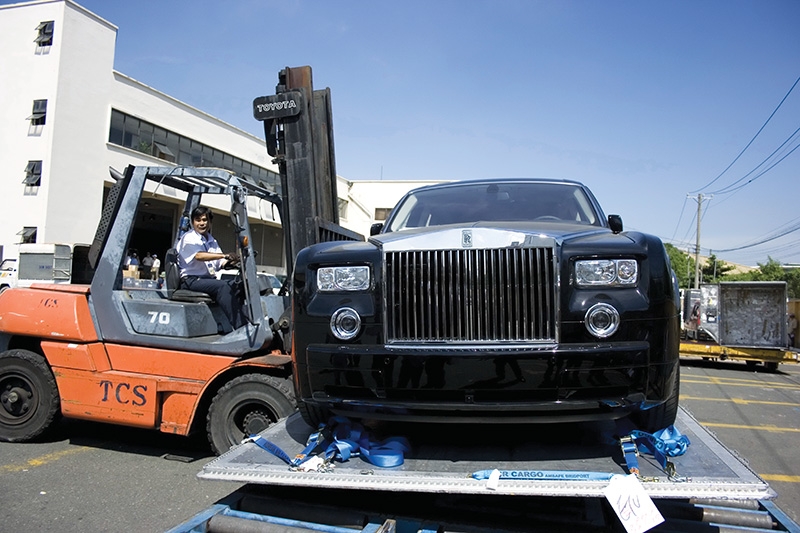Price wars imminent as initial fees reduce
 |
| Under current regulations, buyers of imported cars have to pay registration fees of 10-12 per cent |
The European Chamber of Commerce (EuroCham) noted in its newly-released Whitebook on the year’s investment issues affecting the business community that, “Currently, buyers of cars with less than nine seats in Vietnam are subject to a 10 per cent registration fee, or 12 per cent for residents of Hanoi. With the decision to reduce registration fee, buyers of domestically-manufactured and assembled vehicles will only have to pay a fee of 5-6 per cent. Those who buy cars imported from abroad still have to pay registration fees of 10-12 per cent, depending on the locality.”
It added that “with domestic car companies in joint ventures, only two European brands out of 19 imported in Vietnam will benefits on their locally-assembled models.”
However, according to the Vietnam Automobile Manufacturers’ Association, the temporary 50 per cent cut in registration fees for locally-assembled cars starting from June 26 and lasting until the end of the year aims to encourage domestic production. If applied to imported cars, the preferential policy will no longer be meaningful. Moreover, not only luxury cars from Europe but also cars from some ASEAN countries such as Thailand and Indonesia will enter into Vietnam on a massive scale.
In 2019, completely-built-up (CBU) imported passenger cars increased by 54 per cent to almost 91,000. Imports from Thailand and Indonesia now represent 90 per cent, as some completely-knocked-down (CKD) assemblers have switched to CBU import from the ASEAN.
With approval given for a 50 per cent cut in registration fees for locally-assembled cars, makers with many domestic and assembled models such as Truong Hai Auto Corporation (THACO), Thanh Cong, VinFast, Toyota, Peugeot, and Mercedes-Benz will benefit as customers move from CBU units to localised models. The fee cut can help the auto market stay afloat after recent global woes due to COVID-19.
In order to lure in customers for domestically-produced vehicles, Ford’s new EcoSport model is set for release this year after it gets its license from Vietnam Register.
Although there is no official announcement for planning to domestically-produce the Honda CR-V instead of importing the model, Honda has already received the licence for it.
Imported Honda CR-V products, the group’s bestseller, will lose many of its advantages and even have to join a price war with domestically-assembled vehicles. Imported CR-Vs model are now priced between VND983 million-1.09 billion ($42,700-47,500), and customers in Hanoi have to pay VND118-130 million ($5,100-5,700) registration fee. Meanwhile, customers only need to pay about VND60 million ($2,600) for a locally-built Mazda CX-5 or a Hyundai.
In 2019, locally-invested THACO launched two factories for Mazda and THACO Bus with capacity at 50,000 and 20,000 vehicles per year, respectively. Toyota imports CBU cars from the ASEAN but also upgraded its factory to 90,000 vehicles per year. Mitsubishi plans to open a second factory to produce up to 50,000 vehicles this year, while Hyundai Thanh Cong announced investment in a second factory to double capacity to 240,000 vehicles per year.
Besides registration fees, European car makers suggested that the Ministry of Finance exceptionally re-allows partial clearance at customs by re-authorising bonded warehouses for new CBU-imported vehicles until December. Such customs clearance extension should provide the necessary time for importers to recover financially and pay taxes gradually as they sell their stock as the economy recovers.
The warehouses are not allowed to import CBU vehicles for sale in Vietnam, and CBU importers must pay all taxes including import, special consumption, and VAT at customs clearance immediately. With car sales in Vietnam now low, the market will take time to recover as customers look to ensure their own financial safety. Thus, cash is scarce both at importers and dealers and will remain so until a global recovery in the supply chain and the market as a whole, according to EuroCham.
What the stars mean:
★ Poor ★ ★ Promising ★★★ Good ★★★★ Very good ★★★★★ Exceptional
Related Contents
Latest News
More News
- Foreign leaders extend congratulations to Party General Secretary To Lam (January 25, 2026 | 10:01)
- 14th National Party Congress wraps up with success (January 25, 2026 | 09:49)
- Congratulations from VFF Central Committee's int’l partners to 14th National Party Congress (January 25, 2026 | 09:46)
- 14th Party Central Committee unanimously elects To Lam as General Secretary (January 23, 2026 | 16:22)
- Worldwide congratulations underscore confidence in Vietnam’s 14th Party Congress (January 23, 2026 | 09:02)
- Political parties, organisations, int’l friends send congratulations to 14th National Party Congress (January 22, 2026 | 09:33)
- Press release on second working day of 14th National Party Congress (January 22, 2026 | 09:19)
- 14th National Party Congress: Japanese media highlight Vietnam’s growth targets (January 21, 2026 | 09:46)
- 14th National Party Congress: Driving force for Vietnam to continue renewal, innovation, breakthroughs (January 21, 2026 | 09:42)
- Vietnam remains spiritual support for progressive forces: Colombian party leader (January 21, 2026 | 08:00)

 Tag:
Tag:




















 Mobile Version
Mobile Version